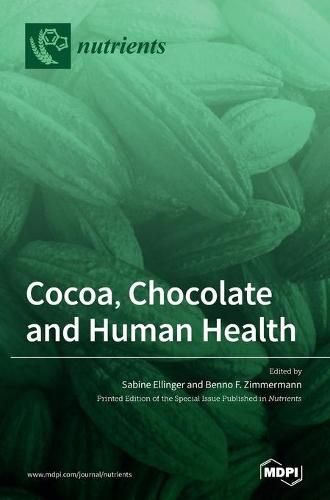Readings Newsletter
Become a Readings Member to make your shopping experience even easier.
Sign in or sign up for free!
You’re not far away from qualifying for FREE standard shipping within Australia
You’ve qualified for FREE standard shipping within Australia
The cart is loading…






This title is printed to order. This book may have been self-published. If so, we cannot guarantee the quality of the content. In the main most books will have gone through the editing process however some may not. We therefore suggest that you be aware of this before ordering this book. If in doubt check either the author or publisher’s details as we are unable to accept any returns unless they are faulty. Please contact us if you have any questions.
This book entitled Cocoa, Chocolate, and Human Health presents the most recent findings about cocoa and health in 14 peer-reviewed chapters including nine original contributions and five reviews from cocoa experts around the world. Bioavailability and metabolism of the main cocoa polyphenols, i.e., the flavanols like epicatechin, are presented including metabolites like valerolactones that are formed by the gut microbiome. Many studies, including intervention studies or epidemiological observations, do not focus on single compounds, but on cocoa as a whole. This proves the effectiveness of cocoa as a functional food. A positive influence of cocoa on hearing problems, exercise performance, and metabolic syndrome is discussed with mixed results; the results about exercise performance are contradictive. Evidence shows that cocoa flavanols may modulate some risk factors related to metabolic syndrome such as hypertension and disorders in glucose and lipid metabolism. However, several cardiometabolic parameters in type 2 diabetics were not affected by a flavanol-rich cocoa powder as simultaneous treatment with pharmaceuticals might have negated the effect of cocoa. The putative health-promoting components of cocoa are altered during processing like fermentation, drying, and roasting of cocoa beans. Chocolate, the most popular cocoa product, shows remarkable losses in polyphenols and vitamin E during 18 months of storage.
$9.00 standard shipping within Australia
FREE standard shipping within Australia for orders over $100.00
Express & International shipping calculated at checkout
This title is printed to order. This book may have been self-published. If so, we cannot guarantee the quality of the content. In the main most books will have gone through the editing process however some may not. We therefore suggest that you be aware of this before ordering this book. If in doubt check either the author or publisher’s details as we are unable to accept any returns unless they are faulty. Please contact us if you have any questions.
This book entitled Cocoa, Chocolate, and Human Health presents the most recent findings about cocoa and health in 14 peer-reviewed chapters including nine original contributions and five reviews from cocoa experts around the world. Bioavailability and metabolism of the main cocoa polyphenols, i.e., the flavanols like epicatechin, are presented including metabolites like valerolactones that are formed by the gut microbiome. Many studies, including intervention studies or epidemiological observations, do not focus on single compounds, but on cocoa as a whole. This proves the effectiveness of cocoa as a functional food. A positive influence of cocoa on hearing problems, exercise performance, and metabolic syndrome is discussed with mixed results; the results about exercise performance are contradictive. Evidence shows that cocoa flavanols may modulate some risk factors related to metabolic syndrome such as hypertension and disorders in glucose and lipid metabolism. However, several cardiometabolic parameters in type 2 diabetics were not affected by a flavanol-rich cocoa powder as simultaneous treatment with pharmaceuticals might have negated the effect of cocoa. The putative health-promoting components of cocoa are altered during processing like fermentation, drying, and roasting of cocoa beans. Chocolate, the most popular cocoa product, shows remarkable losses in polyphenols and vitamin E during 18 months of storage.